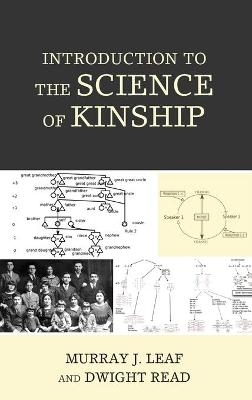
Introduction to the Science of Kinship
Seiten
2020
Lexington Books (Verlag)
978-1-7936-3237-1 (ISBN)
Lexington Books (Verlag)
978-1-7936-3237-1 (ISBN)
Humans organize systems of social ideas through structures of kinship. In Introduction to the Science of Kinship, Murray J. Leaf and Dwight Read describe what those ideas are, how they are used, and what this implies for the science of human social organization.
In Introduction to the Science of Kinship, Murray J. Leaf and Dwight Read illustrate how humans organize systems of social ideas through structures of kinship and outline what this implies for the science of human social organization. Leaf and Read explain that every human society has a social organization that is associated with a distinct vocabulary, which correlates with a particular system of interrelated definitions of social roles and relations. These roles and relations have four specific logical properties: reciprocity, transitivity, boundedness, and imaginary spatial dimensionality. These properties allow individuals to use them in communication to create ongoing, agreed-upon, organizations. This book is recommended for scholars of anthropology, sociology, linguistics, and mathematics.
In Introduction to the Science of Kinship, Murray J. Leaf and Dwight Read illustrate how humans organize systems of social ideas through structures of kinship and outline what this implies for the science of human social organization. Leaf and Read explain that every human society has a social organization that is associated with a distinct vocabulary, which correlates with a particular system of interrelated definitions of social roles and relations. These roles and relations have four specific logical properties: reciprocity, transitivity, boundedness, and imaginary spatial dimensionality. These properties allow individuals to use them in communication to create ongoing, agreed-upon, organizations. This book is recommended for scholars of anthropology, sociology, linguistics, and mathematics.
Murray J. Leaf is emeritus professor of anthropology and political economy at the University of Texas at Dallas. Dwight W. Read is professor emeritus of anthropology at the University of California, Los Angeles.
List of Figures
List of Tables
Acknowledgments and Who Did What
Chapter 1: Introduction
Chapter 2: The Path to the Kinship Apocalypse
Chapter 3: Theory of Organizations
Chapter 4: Kinship and Biology
Chapter 5: Kinship Maps
Chapter 6: Ideas Attached to Kinship Maps
Chapter 7: Domestic Group Organizations
Chapter 8: The Hopi
Chapter 9: The Purum
Chapter 10: The Dravidian Problem Transformed
Chapter 11: Kinship, Logic, and Mathematics
Chapter 12: Conclusion
Glossary
References
Index
About the Authors
| Erscheinungsdatum | 10.05.2021 |
|---|---|
| Reihe/Serie | Anthropology of Kinship and the Family |
| Verlagsort | Lanham, MD |
| Sprache | englisch |
| Maße | 160 x 241 mm |
| Gewicht | 617 g |
| Themenwelt | Geisteswissenschaften ► Psychologie ► Entwicklungspsychologie |
| Geisteswissenschaften ► Psychologie ► Sozialpsychologie | |
| Sozialwissenschaften ► Ethnologie | |
| Sozialwissenschaften ► Soziologie | |
| ISBN-10 | 1-7936-3237-5 / 1793632375 |
| ISBN-13 | 978-1-7936-3237-1 / 9781793632371 |
| Zustand | Neuware |
| Haben Sie eine Frage zum Produkt? |
Mehr entdecken
aus dem Bereich
aus dem Bereich
Vormals Oerter & Montada
Buch | Hardcover (2018)
Julius Beltz GmbH & Co. KG (Verlag)
64,00 €
Deutsche Auflage unter Mitarbeit von Sabina Pauen
Buch | Hardcover (2022)
Springer (Verlag)
59,98 €
praktische Hilfen für Kinder und Jugendliche im Autismus-Spektrum
Buch | Softcover (2023)
Kohlhammer (Verlag)
31,00 €


